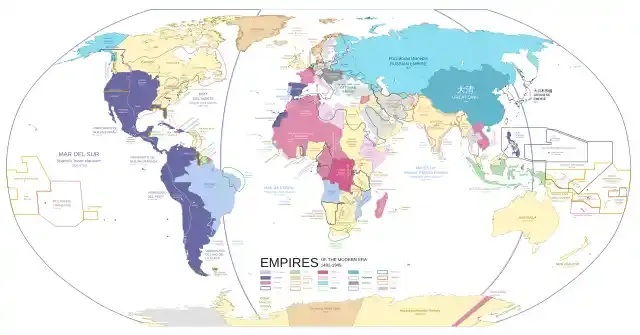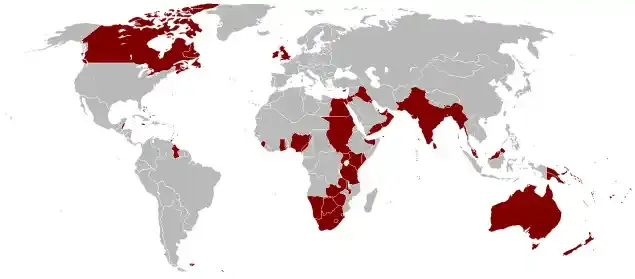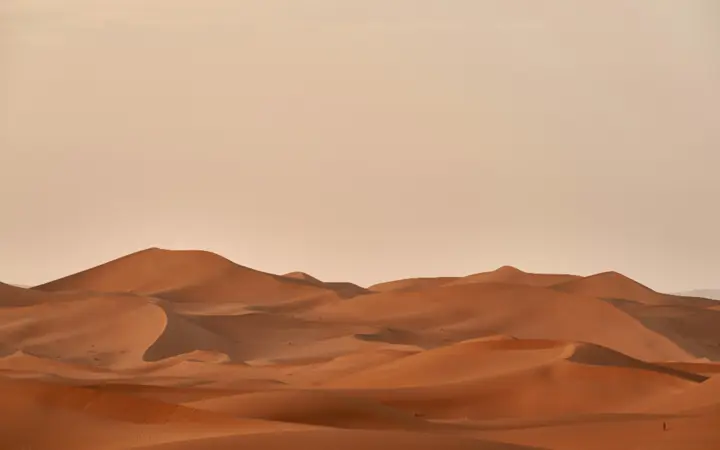Empires that changed the world
Cyrus the Great founded the Achaemenid Persian Empire around 550 BC, which was known as the King of Kings (Shahanshah). Although the Persian Empire ended in a shameful end at the hands of Alexander the Great in 330 BC, it left a lasting legacy in the subsequent development of world civilizations and future empires. Indeed, the Persian Empire was a pivotal empire because it was the first true empire to set the standard for what it meant to be an empire for the future empire. The Persian Empire arose at a unique time in history, when most of the civilized, sedentary, populated world was centered in or near the Middle East. As a result, the Persian Empire, which controlled most of the Middle East, ruled more of the world's population than any other empire in history. In fact, in 480 BC, the Persian Empire had a population of about 49.4 million, accounting for 44% of the world's population at the time. The Persian Empire was the first empire to connect multiple regions of the world, including the Middle East, North Africa, Central Asia, India, Europe, and the Mediterranean world. It has given rise to the concept of empires in places like Greece and India.
Recommend
Show key points
- Cyrus the Great established the Achaemenid Persian Empire, which became the first model of a true empire and significantly influenced future civilizations.
- The Persian Empire, at its height in 480 BC, governed nearly half of the world’s population, making it one of the most demographically dominant empires in history.
- The Roman Empire preserved and expanded Hellenistic culture, while also laying the legal and political foundations for modern Western societies.
- ADVERTISEMENT
- Roman political institutions, particularly the concept of a mixed government, inspired the development of modern democratic systems, including the American government.
- The Mongol Empire, founded by Genghis Khan, became the largest contiguous empire ever and overran powerful civilizations despite having a small population.
- The Mongols utilized mobility and logistics, such as portable herds and self-sustaining tactics, to outmaneuver and conquer vast territories.
- The British Empire shaped the modern world through its promotion of liberalism, rule of law, and institutional governance, becoming the largest empire in history through economic and naval strength rather than sheer military force.
Roman Empire

This should be obvious. The Roman Empire has long been the empire par excellence for the Western world. But its importance is not a product of Western prejudice: the Roman Empire was truly one of the greatest empires in history. The Romans showed the amazing ability to conquer large tracts of land and hold them for hundreds or even thousands of years, if we consider the Eastern Roman Empire (Byzantine Empire). But it was not held together by brute force alone; once conquered, people aspired to become Romans, which meant participating in a sophisticated and civic classical culture. Many important features of the modern world are the result of the Roman Empire. The Romans took over and expanded Hellenistic (Greek) culture, passing Greek architecture, philosophy, and science on to future generations. Later, Roman conversion to Christianity helped elevate this religion from a secondary denomination to one of the world's greatest religions. Roman law also influenced all subsequent legal systems in the West. Romanian institutions also helped inspire systems of government in modern democracies. Despite Greece's reputation as the "cradle of democracy," the American Founding Fathers were primarily influenced by British and Roman practices. Indeed, many have repeatedly spoken of their aversion to the Athenian experience of democracy and their admiration for the Roman form of mixed government, in which monarchy, aristocracy, and democracy elements shared power. The American political system with its separate branches of government is approaching this Roman institutional division. Once the Roman Republic was transformed into the Roman Empire, Caesar's idea and majesty served as an inspiration for future rulers.
Mongol Empire

The Mongol Empire was another empire that grew up on the margins, defeating more powerful and populous enemies, against all odds. It was the largest contiguous empire in the world, which spread terror into the hearts of all its enemies. It was founded by the Mongol warlord Temujin, who assumed the title of Genghis Khan in 1206 CE. The Mongol Empire first grew by wresting parts of China, as did many former steppe tribes. But the defining moment for the Mongol Empire was when its ambassadors were killed by the leaders of the neighboring Khwarizmian Empire, which included Iran, Afghanistan, and Central Asia. This was seen as a grave insult to the Great Khan, and subsequent Mongol revenge completely destroyed Central Asia and ended its golden age. Along with the establishment of later European sea routes that bypassed the Silk Road, Mongol invasions heralded the doom of Central Asia as an important region. Although the Mongols numbered only two million in the whole world, they subsequently conquered most of the Middle East, Russia and China under the leadership of the descendants of Genghis Khan. During the height of their power, they suffered few setbacks except for their failed invasion of Japan and the Battle of Ain Jalut against the Egyptian Mamluks in 1260 CE. How did the Mongols manage to achieve these achievements? Despite their small population, the Mongols were able to mobilize large and mobile armies against their enemies because they carried their herds with them and were able to support themselves on the blood of horses. In the pre-cooling era, it was logistically difficult for Chinese bases to muster a similar army.
British Empire
The British have essentially made the modern world. British institutions of representative democracy inspired French Enlightenment philosophers such as Montesquieu to devise theories of modern government that influenced other modern European countries. The main characteristics of the United States were a commitment to liberalism, the rule of law, civil rights, and trade inherited from the British and spread throughout the world. Most of these characteristics evolved organically over the long history of England, rather than as a result of a master plan. These characteristics were also instrumental in helping the British Empire to grow, prosper and retain any territory it controlled. Moreover, its example has been widely imitated, both because of its financial prowess and its naval power. At its peak in the early twentieth century, the British Empire spanned nearly a quarter of the world and is the largest of any empire in history. This achievement was made possible by England's organizational exploits and financial prowess rather than by a huge army. For example, the British invasion of India was mostly for Indian troops who were paid by the British, who chose to serve the British because of the regular salaries and benefits they were offering. London has also shown a remarkable ability to deal with multiple wars simultaneously. Although they have sometimes lost battles, the British have rarely lost wars.
![]()
The most important technical programs for mobile and computer that are indispensable for everyone
Mobile phones and computers are essential in modern life, and with the right free tools, they can boost your productivity and simplify daily tasks. Apps like Google Chrome, Google Drive, LibreOffice, and VLC Media Player are easy to use and help you stay efficient, secure, and entertained. more- ADVERTISEMENT
![]()
10 things smart people never share with anyone
Smart people often keep quiet about their true knowledge, finances, personal struggles, and future plans. It’s not secrecy—it’s strategy. By choosing what to share, they protect their peace, maintain control, and keep life’s noise at bay. more- ADVERTISEMENT
![]()
Many amazing things your nails can tell you
The Many Surprising Things Your Fingernails Can Tell You more- ADVERTISEMENT
![]()
How to develop your self-confidence?: The journey of character building and self-development
Self-confidence is a powerful inner force that grows through experience, reflection, and personal development. It's not inherited but built over time. With positive thinking, healthy habits, and clear goals, anyone can strengthen their self-worth and face life with courage and resilience. more- ADVERTISEMENT
![]()
Why can't bots click on the "I'm not a robot" box on sites?
Why Can’t Robots Click the 'I’m Not a Robot' Box on Websites more- ADVERTISEMENT
![]()
The Sahara Dilemma: Are Deserts Vital to the Balance of Our Planet?
Deserts may seem lifeless and harsh, but they’re vital to our planet. They store carbon, support unique species, and even help nourish the Amazon Rainforest. Despite their importance, human activities threaten these fragile ecosystems. So yes—deserts matter, and we need them more than we think. more- ADVERTISEMENT
![]()
Can companies avoid Kodak's future fate?
Can Companies Evade the "Kodak" Destiny in The Future? more- ADVERTISEMENT
![]()
Lebanon's basketball team's success story despite economic turmoil
Lebanon’s basketball scene is thriving, with its national team and clubs like Riyadi and Hikmeh making waves internationally. Despite economic struggles, passionate support from the Lebanese diaspora keeps the sport alive, turning basketball into a powerful symbol of national pride and unity across the country and its communities abroad. more- ADVERTISEMENT
![]()
The world's oceans: species, environments, life and the magic of colors
The oceans, covering over 70% of Earth, are changing color due to climate change and human impact. From deep blue in the Pacific to green or milky turquoise in coastal or Arctic waters, these shifts reveal changes in marine life and health, making ocean conservation more vital than ever. more- ADVERTISEMENT
![]()
Traditional Syrian Glass Blowing : A Timeless Craft
Traditional Syrian Glass Blowing : A Timeless Craft more- ADVERTISEMENT





















